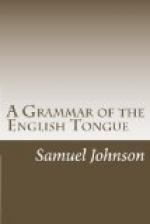Oblique. Thee, You.
You is commonly used in modern writers for ye, particularly in the language of ceremony, where the second person plural is used for the second person singular, You are my friend.
Singular. Plural.
Nom. He, They, Applied to masculines.
Oblique. Him, Them.
Nom. She, They, Applied to feminines.
Oblique. Her, Them.
Nom. It, They, Applied to neuters or things.
Oblique. Its, Them.
For it the practice of ancient writers was to use he, and for its, his.
The possessive pronouns, like other adjectives, are without cases or change of termination.
The possessive of the first person is my, mine, our, ours; of the second, thy, thine, your, yours; of the third, from he, his; from she, her, and hers; and in the plural, their, theirs, for both sexes.
Ours, yours, hers, theirs,
are used when the substantive preceding is
separated by a verb, as These
are our books. These books are ours. Your
children excel ours in stature,
but ours surpass yours in learning.
Ours, yours, hers, theirs,
notwithstanding their seeming plural
termination, are applied equally
to singular and plural substantives,
as, This book is ours.
These books are ours.
Mine and thine were formerly used before a vowel, as mine amiable lady: which though now disused in prose, might be still properly continued in poetry: they are used as ours and yours, when they are referred to a substantive preceding, as thy house is larger than mine, but my garden is more spacious than thine.
Their and theirs are the possessives likewise of they, when they is the plural of it, and are therefore applied to things.
Pronouns relative are, who, which, what, whether, whosoever, whatsoever.
Nom. Who.
Gen. Whose.
Other oblique cases. Whom.
Nom. Which.
Gen. Of which, or whose.
Other oblique cases. Which.
Who is now used in relation to
persons, and which in relation to
things; but they were anciently confounded.
At least it was common to
say, the man which, though I remember no example
of the thing who.
Whose is rather the poetical than regular genitive of which.
The
fruit
Of that forbidden tree, whose mortal taste
Brought death into the world.
Milton.
Whether is only used in the nominative and accusative cases; and has no plural, being applied only to one of a number, commonly to one of two, as Whether of these is left I know not. Whether shall I choose? It is now almost obsolete.




